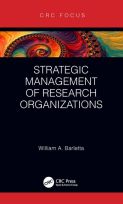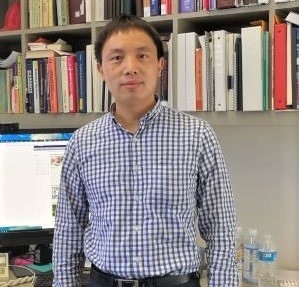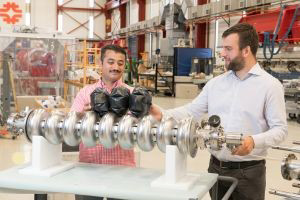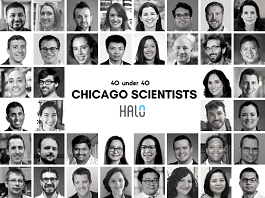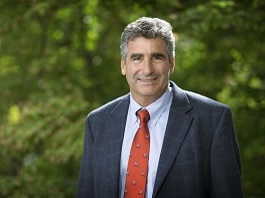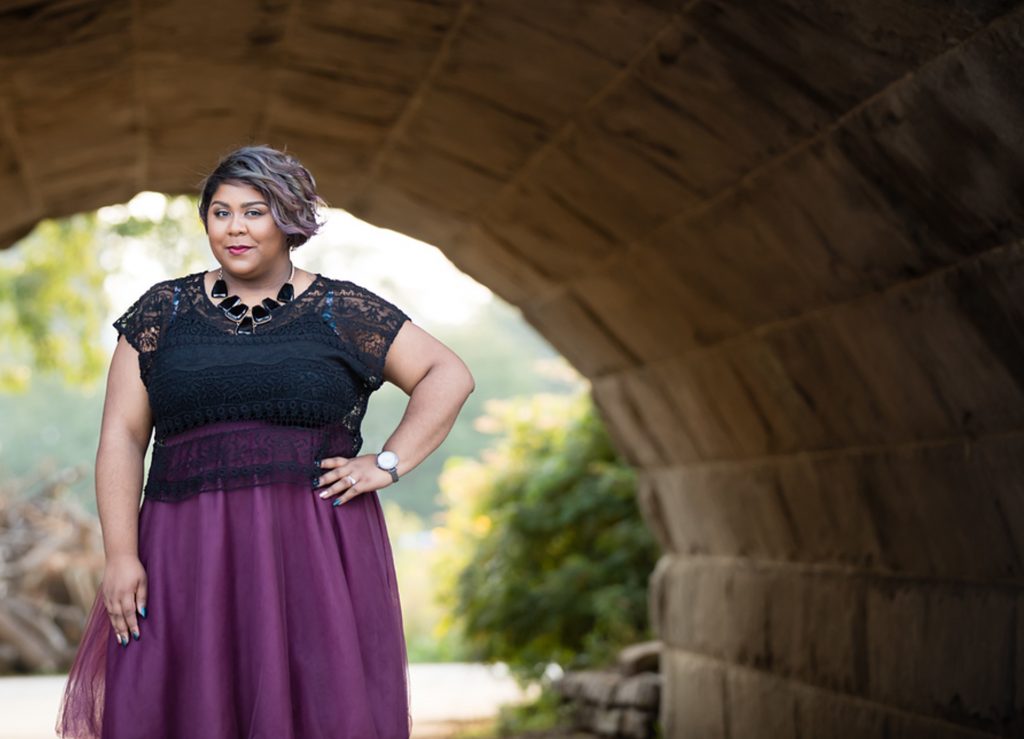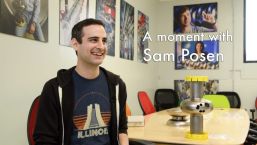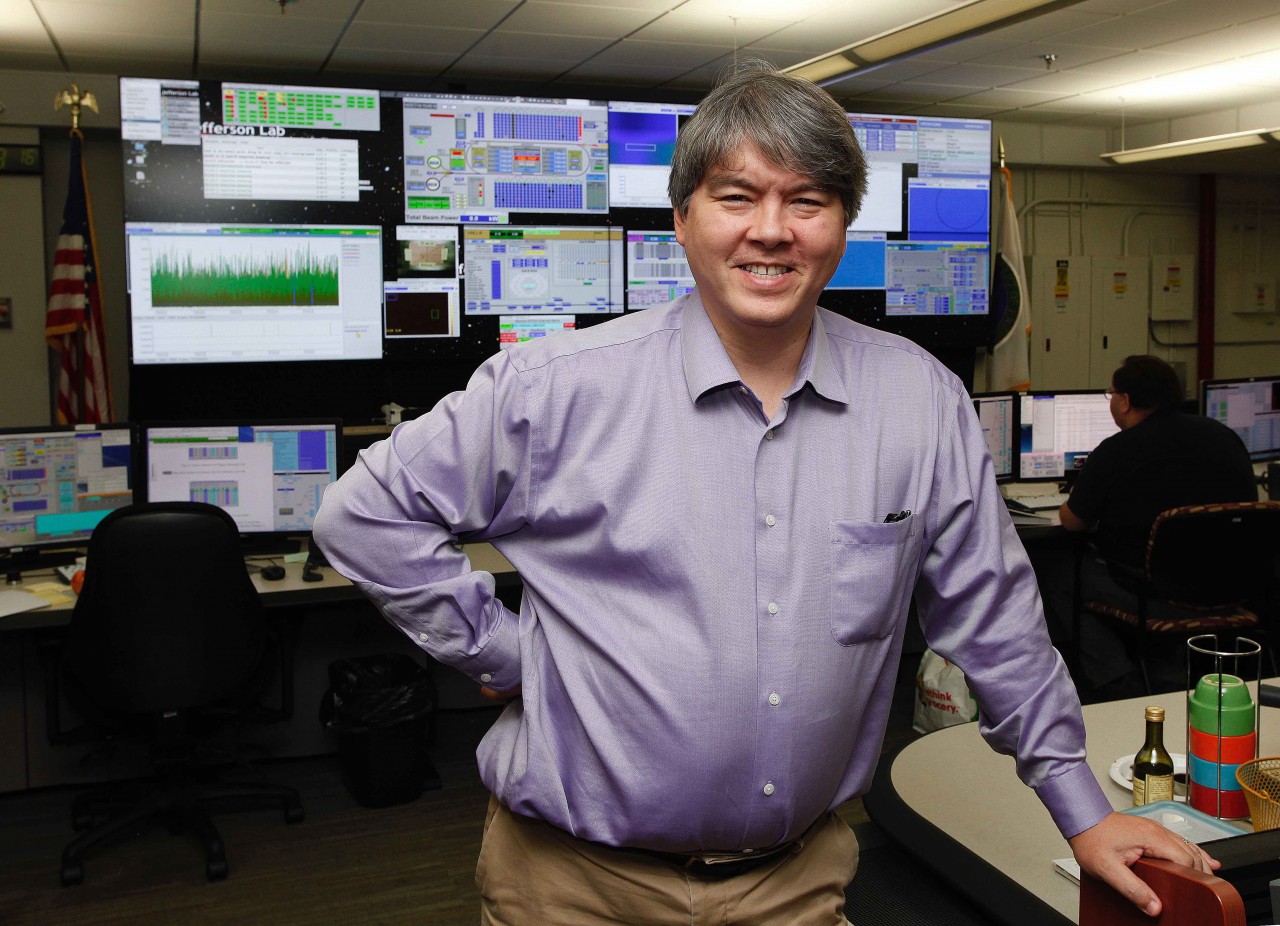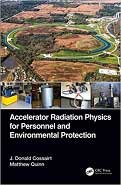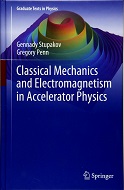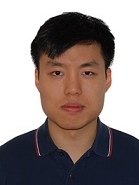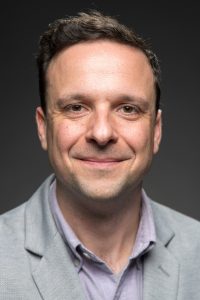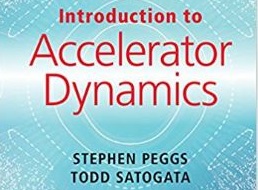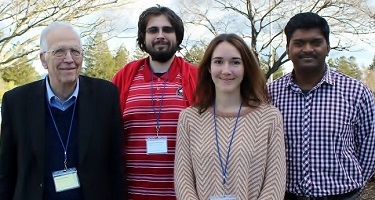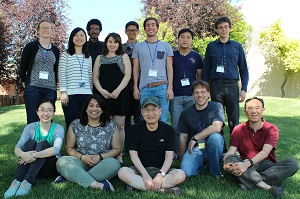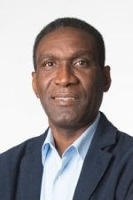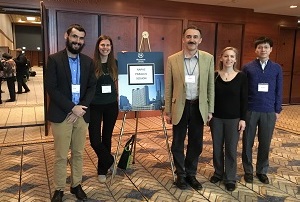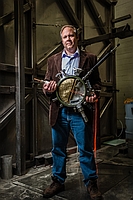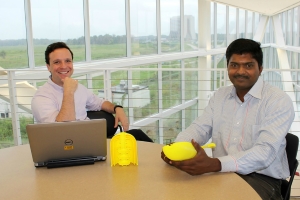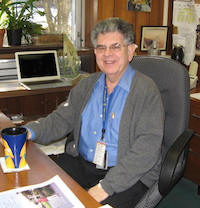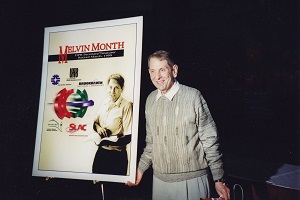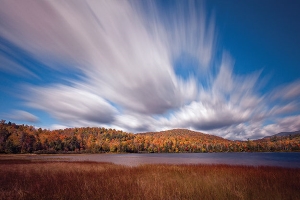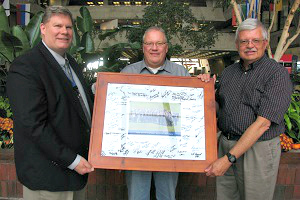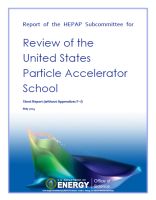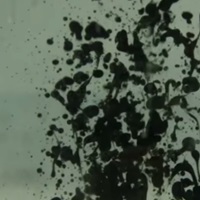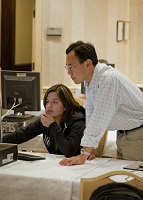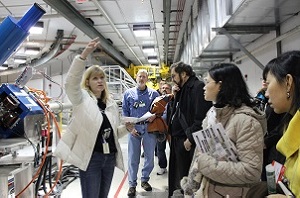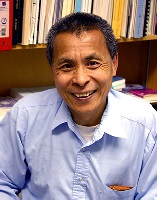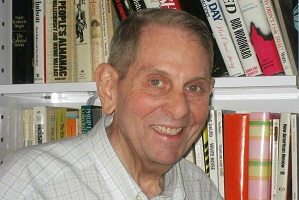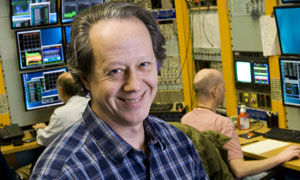 U.S. Particle Accelerator School
U.S. Particle Accelerator School
Recognition and Accolades
2025 - Control system used in Low Level RF Control class adopted by accelerator facilities
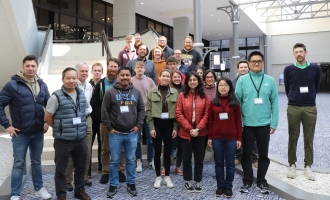
At our Winter 2023 Session in Houston Texas, Larry Doolittle, Qiang Du, Carlos Serrano, Shreeharshini Murthy and Dan Wang taught the Introduction to Digital Low-Level Radio Frequency Controls in Accelerators course. The open-source LLRF system used in the class is now adopted by:
- SLAC National Accelerator Laboratory, to upgrade the existing LLRF systems in the Linac Coherent Light Source in the Linac Electronics Modernization Project (LEMP) project;
- Argonne National Laboratory, to upgrade the LLRF system in Argonne Wakefield Accelerator Facility;
- Lawrence Berkeley National Laboratory, to control the accumulator ring RF in the Advanced Light Source Upgrade project;
In addition, the same LLRF system design is being evaluated for use by the RF groups at the APS-U facility in Argonne National Laboratory, and at the NSLS-II facility in Brookhaven National Laboratory. Thanks to the teaching team for helping keep RF power in control!
2024 – New Course Sets Sail on Understanding Physics
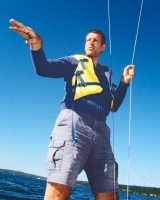
USPAS alumnus and instructor Georg Hoffstaetter de Torquat is a physics professor and can typically be found researching particle accelerator technology, whether for the Electron-Ion Collider project at Brookhaven National Laboratory or other applications like spectrometers and electron microscopes.
But for the fall 2024 semester, he also taught a new course, the Physics of Sailing-marrying his academic field with his lifelong love of the water.
Read more here...
2024 – Maxim Marchevsky and Soren Prestemon prevent magnet meltdowns before they can start
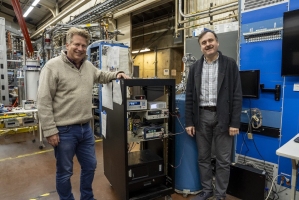
USPAS faculty members Maxim Marchevsky and Soren Prestemon of Lawrence Berkeley National Lab are developing an approach to avoid sudden, potentially destructive energy releases in a new generation of superconducting magnets. Read more here...
2024 – Oak Ridge National Lab’s Johnny Tang sure can Tango
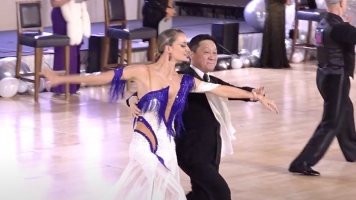
Meet USPAS alumnus Johnny Tang – Controls Software Engineer and competitive ballroom dancer. Read more here...
2024 – Ram Dhuley receives the Roger W. Boom Award
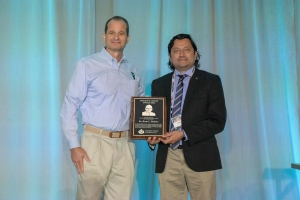
USPAS alumnus and faculty member Ram Dhuley received the 2024 Roger W. Boom Award from the Cryogenic Society of America for his pioneering work on cryocooler conduction-cooled superconducting radio frequency cavities, his editorial efforts for the Journal of Cryogenics and his recent appointment to the editorial board of advances in cryogenics. Read more here...
2024 – Don Lincoln awarded the 2024 Dwight Nicholson Medal and 2024 Klopsteg Memorial Lecture Award
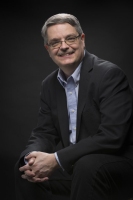
The American Physical Society recently awarded USPAS alumnus Don Lincoln the 2024 Dwight Nicholson Medal for his scientific outreach, particularly his internationally influential presentations and publications that educate students and general audiences on the meaning of fundamental scientific research. The Dwight Nicholson Medal has recognized individuals who provide invaluable service to the world of science, education and outreach. This includes public lectures and public media, teaching, research or other science-related activities.
Earlier this year, Lincoln was awarded the 2024 Klopsteg Memorial Lecture Award for his work in scientific outreach. Lincoln’s public speeches, publications, YouTube videos and articles are written with a lay audience in mind. They provide the public with accessible information about scientific topics, from cosmology to high-energy particle physics. Read more here...
2024 – Gennady Stupakov Wins Prestigious Particle Accelerator Science Award
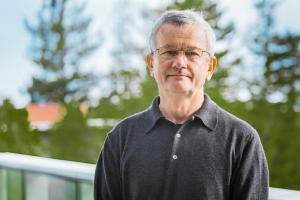
USPAS faculty and Curriculum Committee member Gennady Stupakov received the 2024 IEEE Nuclear and Plasma Sciences Society’s Particle Accelerator Science and Technology Award (PAST Award). The IEEE Nuclear and Plasma Sciences Society bestows the Particle Accelerator Science and Technology Award to individuals who have made outstanding contributions to the development of particle accelerator science and technology.
The 2024 PAST Award recognizes Dr. Stupakov’s broad contributions in accelerators, including innovative advances in the areas of collective effects and free-electron lasers, enabling robust operation and extended performance. Read more about the award here...
2024 – Meet Jefferson Lab Associate Director Andrei Seryi
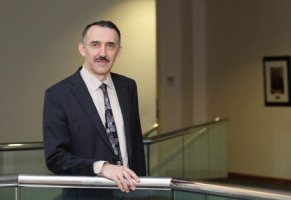
USPAS instructor Andrei Seryi is the Associate Director for Accelerator Operations, Research and Development at Jefferson Lab. Read more about Andrei and his book "Unifying Physics of Accelerators, Lasers and Plasma", which is based on his USPAS course, here...
2024 – Bill Pellico receives URA honorary engineering award
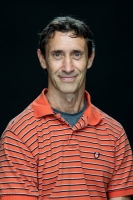
USPAS alumni Bill Pellico received an engineering award for his many contributions to DUNE and to Fermilab over the years.
Read more here...
2024 – Matilda Mwaniki receives RadiaSoft scholarship
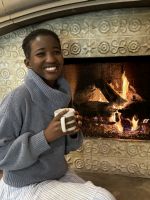
Illinois Institute of Technology graduate student Matilda Mwaniki was selected to receive a scholarship from RadiaSoft LLC to attend our summer 2024 session. RadiaSoft scientists simulate vacuum chambers, particle accelerators, radiation shielding, X-ray beamlines, thermionic converters, electron beam welding and other systems for industry, universities and national labs. They deliver software solutions via Sirepo, their open source framework for cloud computing, https://github.com/radiasoft/sirepo, which is used to develop intuitive browser-based GUIs for a wide range of high-performance codes. Sirepo.com is their free Science Gateway for particle accelerator and X-ray beamline design. Sirepo/Elegant and Sirepo/Synergia have been used to teach accelerator physics at USPAS and in South Korea. Sirepo/SRW is used for classroom education at La Trobe University in Australia. Congratulations, Matilda!
Read more about RadiaSoft at www.radiasoft.net
2024 – “Behind the Science: Accelerator Operators”
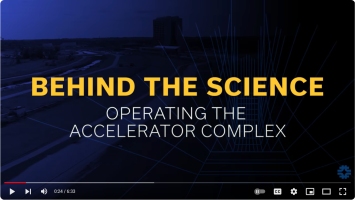
USPAS alumni, Cindy Joe and Trey Thompson, explain accelerator operations at Fermilab.
Watch full video on Youtube...
2023 - John Galambos: 40 years of charting new courses in technology
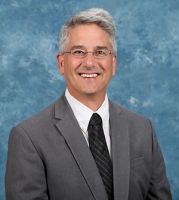
Meet USPAS faculty member John Galambos of Oak Ridge National Lab. Read more here...
2023 - James Sebek receives 2023 Lytle Award for decades of synchrotron problem solving and dedication
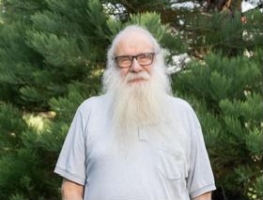
USPAS instructor and alumni Jim Sebek will receive this year’s Farrel W. Lytle Award for his countless contributions toward building, maintaining and operating the SSRL for nearly four decades.
Read more here...
2023 – Claudio Emma receives DOE Early Career Award
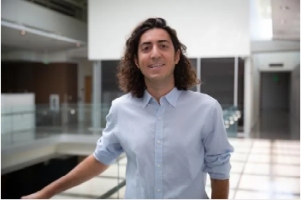
USPAS alumnus, Claudio Emma, receives a DOE Early Career Award.
Read more here...
2023 – Silvia Zorzetti receives DOE Early Career Research Award
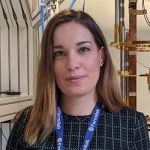
USPAS instructor Silvia Zorzetti was given a DOE Early Career Research Award for her project, "Advancing Quantum Sensors and Sensor Networks with High-Efficiency Transduction”.
Read more here...
2023 – Meet Eduard Pozdeyev – Director of CEBAF Operations
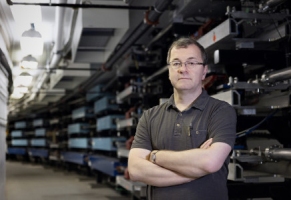
USPAS alumni and instructor, Eduard Pozdeyev, becomes director of accelerator operations for the lab’s Continuous Electron Beam Accelerator Facility (CEBAF).
Read more here…
2023 – Donato Passarelli wins URA Engineering Award
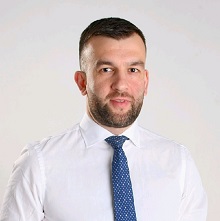
USPAS alumnus Donato Passarelli is the first recipient of a new URA Engineering award. “The URA Engineering Award recognizes the engineering talent necessary to advance science and our understanding of the world,” said URA President John Mester. “Donato Passarelli has been integral to forwarding PIP-II and the development of superconducting radio frequency technology.”
Read more here...
2023 – One Minute With Brian Vaughn
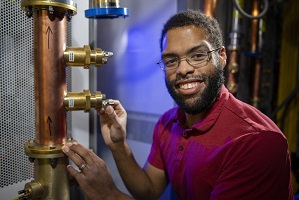
USPAS alumnus and faculty member Brian Vaughn is interviewed by Fermi Today.
Read the interview here...
2023 – Sekazi K. Mtingwa receives the AAAS Philip Hauge Abelson Prize
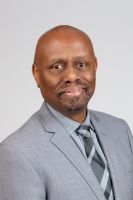
Sekazi K. Mtingwa is the recipient of the 2023 American Association for the Advancement of Science's Philip Hauge Abelson Prize, which recognizes someone who has made significant contributions to the scientific community — whether through research, policy or civil service — in the United States. The awardee can be a public servant, scientist or individual in any field who has made sustained, exceptional contributions and other notable services to the scientific community. "Mtingwa exemplifies a commitment to service and dedication to the scientific community, research workforce and society. His contributions have shaped research, public policy and the next generation of scientific leaders", according to the award’s selection committee.
Read about the Philip Hauge Abelson Prize here …
2023 – Brookhaven's Navid Vafaei-Najafabadi Awarded Prestigious NSF Early CAREER Grant
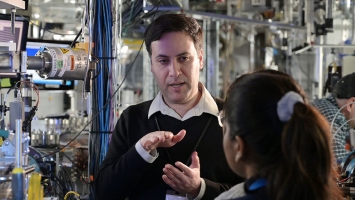
USPAS instructor Navid Vafaei-Najafabadi helps pave the way for new physicists.
Read more here...
2023 – Ying Wu receives 2022 FEL Prize
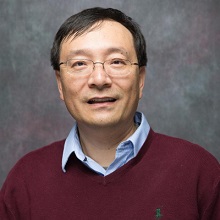
Duke University professor, Associate Director for Light Sources at the Triangle Universities Nuclear Lab and USPAS faculty member Ying Wu is the co-winner of the 2022 FEL prize at the 40th International Free Electron Laser Conference in Trieste Italy. The FEL prize is awarded to a person or persons who have contributed significantly to the advancement of the field of Free-Electron Lasers. In addition, the Prize gives the international FEL community the opportunity to recognize one or more of its members for their outstanding achievements.
Read the interview here...
2022 - A few words about the Lee Teng Internship
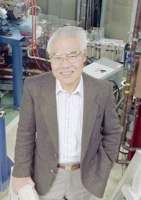
Since 2008, Fermilab and Argonne National Lab have jointly run a prestigious summer undergraduate program to help develop the next generation of researchers in accelerator science and technology.
Read more here...
2022 – Meet Cliff Brutus: Mechanical Engineer, Project Manager, and Life-Long Learner
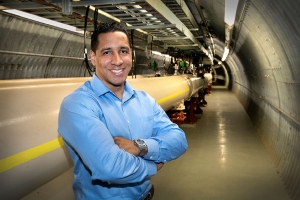
Meet USPAS alumni, Cliff Brutus.
Read more here...
2022 – Jean Delayen receives 2022 IEEE NPSS Particle Accelerator Science and Technology Award
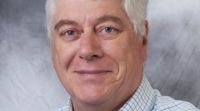
Old Dominion University physics professor Jean Delayen has been recognized for his innovative contributions to the field of accelerator science, both as a physicist and educator.
Delayen is one of two winners of the 2022 Institute of Electrical and Electronics Engineers (IEEE) Nuclear and Plasma Sciences Society (NPSS) Particle Accelerator Science and Technology (PAST) Award. As the founding director of ODU's Center for Accelerator Science (CAS), Delayen has created applied research opportunities for undergraduate and graduate students in particle accelerator design.
"Jean's leadership was critical to the development of the Center for Accelerator Science at ODU in partnership with Jefferson Lab," said Gail Dodge, dean of College of Sciences. "He has always championed accelerator science education and has built CAS into a leading institute for education and research."
Delayen is receiving the PAST award because of his outstanding contributions to the development of particle accelerator science, technology and education. As a senior staff scientist at Jefferson Lab in the Center for Advanced Studies of Accelerators (CASA), as well as director of CAS at ODU, Delayen's research is crucial to Jefferson Lab and other accelerators around the world, such as CERN and the planned EIC at Brookhaven National Lab.
Read more here...
2022 – One Minute With Sajini Wijethunga
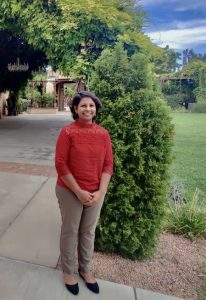
USPAS alumnus Sajini Wijethunga is interviewed by Fermi Today.
Read the interview here...
2022 – Calaga, Krafft, Stupakov receive USPAS Achievement Prize
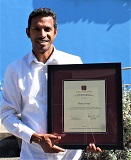
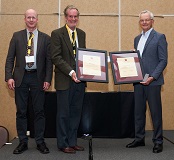
Congratulations to the recipients of the 2022 USPAS Prize for Achievement in Accelerator Science and Technology: Rama Calaga, Geoffrey Krafft and Gennady Stupakov.
The USPAS Achievement Prize honors individuals by recognizing their outstanding achiemevements over the full range of accelerator physics and technology.
2022 – Kayla Hernandez: Electrical Engineer Who Helps Send Particle Beams Into RHIC
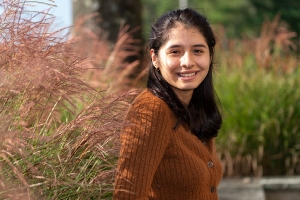
Meet USPAS alumni, Kayla Hernandez.
Read more here...
2022 – Auralee Edelen receives DOE’s Early Career Award
Instructor and alumnus Auralee Edelen from SLAC National Accelerator Laboratory will receive DOE's prestigious Early Career Research Program awards for work that transforms the way scientists tune particle accelerator experiments.
"When she first started studying accelerator physics at Colorado State University, the idea that machine learning could be applied to accelerators was relatively new. At the time, standard tuning procedures seemed like enough to many in the field. But now, researchers are looking for more precise control over beams, especially for newer applications in science and medicine that require unprecedented beam characteristics and stability. "
2022 – Spotlight on Kathy Harkay
"Kathy Harkay was there at the start of the APS, working to determine the limits of what the machine could do. Now she’s working on upgrading the facility, and is looking forward to test-driving the new APS."
2022 – Kavin Ammigan receives DOE’s Early Career Award
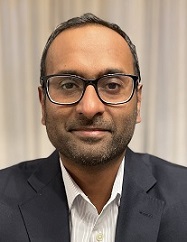
Instructor and alumnus Kavin Ammigan was chosen to receive DOE's prestigious Early Career Award for advanced materials to enable next-generation high-power accelerators.
The award program, now in its 13th year, is designed to bolster the nation’s scientific workforce by providing support to exceptional researchers during the crucial early career years, when many scientists do their most formative work.
2022 – Lia Merminga Appointed Director of Fermilab
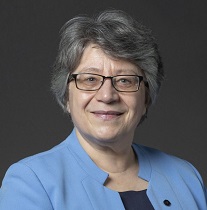
USPAS alumnus and instructor Lia Merminga has been appointed Director of Fermi National Accelerator Laboratory. From the Fermilab newsroom: “Lia Merminga, an internationally renowned physicist and scientific leader, has been appointed to lead Fermi National Accelerator Laboratory, effective April 18. Merminga will be the seventh director of Fermilab, a 6,800-acre facility headquartered in Batavia, Ill., which is the United States’ premier particle physics and accelerator laboratory.”
2022 – Ihar Lobach Receives Outstanding Thesis Research Award
USPAS alumnus Ihar Lobach received the 2022 Outstanding Doctoral Thesis Research in Beam Physics Award from the Division of Physics of Beams of the American Physical Society "for outstanding research contributions to our understanding of undulator radiation fluctuations, and for developing an experimental method to determine electron beam properties from these fluctuations." This award is given annually and recognizes doctoral thesis research of outstanding quality and achievement in beam physics and engineering. The award was established in 1990 by the Division of Physics of Beams and is supported by Brookhaven Science Associates, Fermi Research Associates and Southeastern Universities Research Association/Jefferson Lab.
2022 – New textbook written by “Medical Applications of Accelerators” instructor
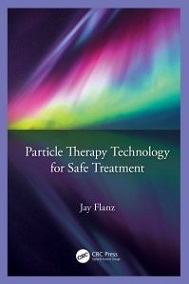
USPAS faculty member Jay Flanz has written a textbook based in part on his Medical Applications of Accelerators course. The book, “Particle Therapy Technology for Safe Treatment” provides a practical introduction to particle therapy. It provides a thorough introduction to the tools, their applications, and then details the components that are needed to implement it. It explains the foundations of beam production and beam delivery which serve to meet the necessary clinical requirements. It emphasizes the relationship between requirements and implementation including how safety and quality is considered and implemented in the solution. The reader will learn to better understand what parameters are important to achieve these goals
It will be a useful resource for physicists in the field of particle therapy in addition to biomedical engineers and practitioners in the field of accelerator physics. It can also be used as a textbook for graduate medical physics and accelerator physics courses.
Read more here……
2022 – Steve Holmes Receives Robert R. Wilson Prize for Achievement in the Physics of Particle Accelerators
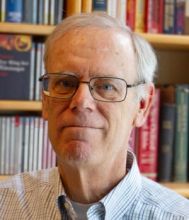
USPAS faculty member and long-time advisor Steve Holmes of Fermilab will receive the 2022 Wilson Prize “For leadership in developing the modern accelerator complex at Fermilab, enabling the success of the Tevatron program that supports rich programs in neutrino and precision physics.” Created to recognize and encourage outstanding achievement in the physics of particle accelerators, this prestigious prize was established in 1986 by friends of Robert R. Wilson, the APS Division of Particles and Fields and Division of Physics of Beams.
Read more here……
2021 - Irina Petrushina named Blavatnik Regional Awards Finalist
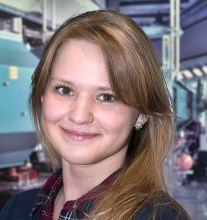
Irina Petrushina, a research assistant professor at Stony Brook University who conducts research in accelerator physics at the U.S. Department of Energy’s Brookhaven National Laboratory, has been named a 2021 Blavatnik Regional Awards for Young Scientists finalist in recognition of her contributions to the field of modern accelerator physics.
Read more here……
2021 – Jose Ferradas Troitino awarded IEEE CSC Graduate Study Fellowship in Applied Superconductivity

Jose Ferradas Troitino was awarded the IEEE Council on Superconductivity’s Graduate Study Fellowship in Applied Superconductivity. Jose’s PhD thesis, done both at University of Geneva and CERN, covers two different domains in the field of Applied Superconductivity: Large Scale and Materials, shedding new light into the mechanical behaviour of an accelerator magnet during a quench. Since 2021, he is working in the production of the new Nb3Sn quadrupole magnets (MQXF) for the High-Luminosity upgrade of the Large Hadron Collider (LHC) at CERN. These will be the first Niobium-Tin magnets ever installed in a particle accelerator.
Read more here……
2021 – One Minute With Arden Warner
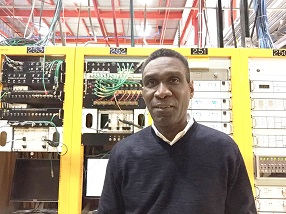
USPAS instructor and alumnus Arden Warner is interviewed by Fermi Today.
Read the interview here……
2020 – Northern Illinois Flourishes as Accelerator R&D Hub Under Fermilab Leadership
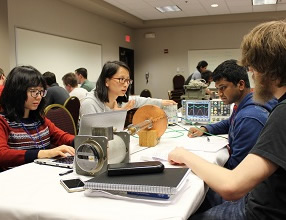
The potential of accelerators is boundless, so accelerator research is a strong draw for early-career scientists. Perhaps this explains why Mike Syphers, an NIU research professor of physics, has yet to see a saturated demand for accelerator scientists, even as large projects have come and gone.
The U.S. Particle Accelerator School, he noted, attracts near-record-setting numbers of students every year. Fermilab hosts and manages this national, graduate-level program, which provides training and workforce development in the science and technology of charged-particle accelerators and associated systems.
Multiple training programs will help develop young scientists to help realize the field’s future plans.
Read more here.....
2020 – One Minute With Bryan Ramson
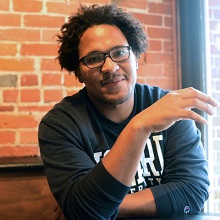
USPAS alumnus Bryan Ramson is interviewed by Fermi Today.
Read the interview here...
2020 – Siqi Li Receives Outstanding Doctoral Thesis Research in Beam Physics Award
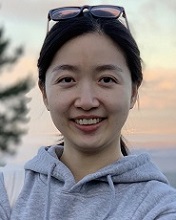
USPAS alumnus Siqi Li of Stanford University received the 2020 Outstanding Doctoral Thesis Research in Beam Physics Award from the Division of Physics of Beams of the American Physical Society "for seminal contributions in laser shaping of electron beams in photocathode RF guns and for laser streaking measurements of attosecond pulses in X-ray Free-Electron Lasers." This award is given annually and recognizes doctoral thesis research of outstanding quality and achievement in beam physics and engineering. Siqi will receive the award and present a talk at a meeting of the APS Division of Physics of Beams. The award was established in 1990 by the Division of Physics of Beams and is supported by Brookhaven Science Associates, Fermi Research Associates, and Southeastern Universities Research Association/Jefferson Lab.
Read more here.....
2020 – Laura Fields and Jonathan Jarvis receive DOE Early Career Research Award


USPAS faculty member Laura Fields and alumnus Jonathan Jarvis received the 2020 DOE Early Career Research Award, a prestigious award designed to bolster the nation’s scientific workforce by providing support to exceptional researchers during the crucial early years, when many scientists do their most formative work.
Read more here.....
2020 – Bruce Carlsten Receives Robert R. Wilson Prize for Achievement in the Physics of Particle Accelerators
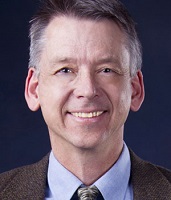
USPAS faculty member Bruce Carlsten of Los Alamos National Laboratory received the 2020 Robert R. Wilson Prize for Achievement in the Physics of Particle Accelerators from the Division of Physics of Beams of the American Physical Society "for the discovery and subsequent implementation of emittance compensation in photoinjectors that has enabled the development of high brightness, X-ray free electron lasers such as the Linac Coherent Light Source." Created to recognize and encourage outstanding achievement in the physics of particle accelerators, this prestigious prize was established in 1986 by friends of Robert R. Wilson, the Division of Particles and Fields, and the Division of Physics of Beams.
Read more here.....
2019 – Management textbook written by former USPAS Director William Barletta
William Barletta has written a textbook inspired by his USPAS class “Strategic Management of Research Labs". This entry-level graduate text describes a tested top-down enterprise-wide approach to managing organizations with a predominant portion of their product being scientific or technological research. It focuses on executive performance and strategic forecasting and planning; goal-setting; communications and marketing, and operations management to realize strategic objectives. This book will be of interest to entrepreneurs, established scientists and engineers and to those studying toward an MBA with specialization in research institutions and major research infrastructures, preparing them to move from research or academia into their first managerial position. It also provides valuable advice and guidance for established middle and senior management in established research enterprises.
Read more here.....
2019 – “Beam-based Correction and Optimization for Accelerators” textbook written by USPAS faculty member
Xiaobiao Huang has written a textbook inspired by his USPAS class “Beam-based Diagnostics”... The book, “Beam-based Correction and Optimization for Accelerators” provides systematic coverage of the beam-based techniques that accelerator physicists use to improve the performance of large particle accelerators, including synchrotrons and linacs. It begins by discussing the basic principles of accelerators, before exploring the various error sources in accelerators and their impact on the machine's performances. The book then demonstrates the latest developments of beam-based correction techniques that can be used to address such errors and covers the new and expanding area of beam-based optimization. This book is an ideal, accessible reference book for physicists working on accelerator design and operation, and for postgraduate studying accelerator physics.
Read more here.....
2019 – Hassan and Passarelli Develop "Balloon Tuning"
Alumni Mohamed Hassan and Donato Passarelli are featured for developing an innovative process called balloon tuning to reshape cavities:
The innovative use of balloons provides a new, patented way for engineers to shape the metal heart of particle accelerators.
Many particle accelerators use structures called cavities, which provide the kick needed to accelerate particles to higher and higher
energies as the particles barrel through one after the other. Situated deep inside an accelerator and cooled by a shell containing
liquid helium, cavities have to be just the right shape and size to boost particles to the desired energies. Even small differences
in the shape of these metal chambers make large differences in the electric fields that are generated inside the cavities to push
particles to greater speeds. Faced with one particular cavity that was too misshaped to use and inaccessible because of its metal shell,
Fermilab engineers Mohamed Hassan and Donato Passarelli got an idea: What if you could reshape a cavity without removing the surrounding
shell? They went to work, developing an innovative process called balloon tuning.
Read more here.....
2019 – Charles Thangaraj Named One of Halo's "40 under 40 Chicago Scientists"
Alumnus and instructor Charles Thangaraj was named one of Halo's "40 under 40 Chicago Scientists":
More than half of cancer patients receive radiation as part of treatment, but current methods rely on complicated machinery and outdated technology. Dr. Charles Thangaraj and his team at Fermilab are developing compact and powerful sources of electron beams based on “deep tech” advances in superconductivity and particle acceleration technology that could significantly reduce the costs of radiation therapy.
Read more here.....
2019 – Tom Katsouleas Named President of the University of Connecticut
Tom Katsouleas will be the next president of the University of Connecticut. “Tom is clearly the right candidate at the right time to lead UConn forward, and we are delighted he has decided to come to Connecticut,” said University of Connecticut Board of Trustees Chair Thomas Kruger.
Tom taught at UCLA, the University of Southern California, was the Dean of Duke University's Pratt School of Engineering and was the Executive Vice President and Provost at the University of Virginia, but perhaps is best known for being a USPAS faculty member.
Read more here.....
2019 – River Robles receives RadiaSoft scholarship
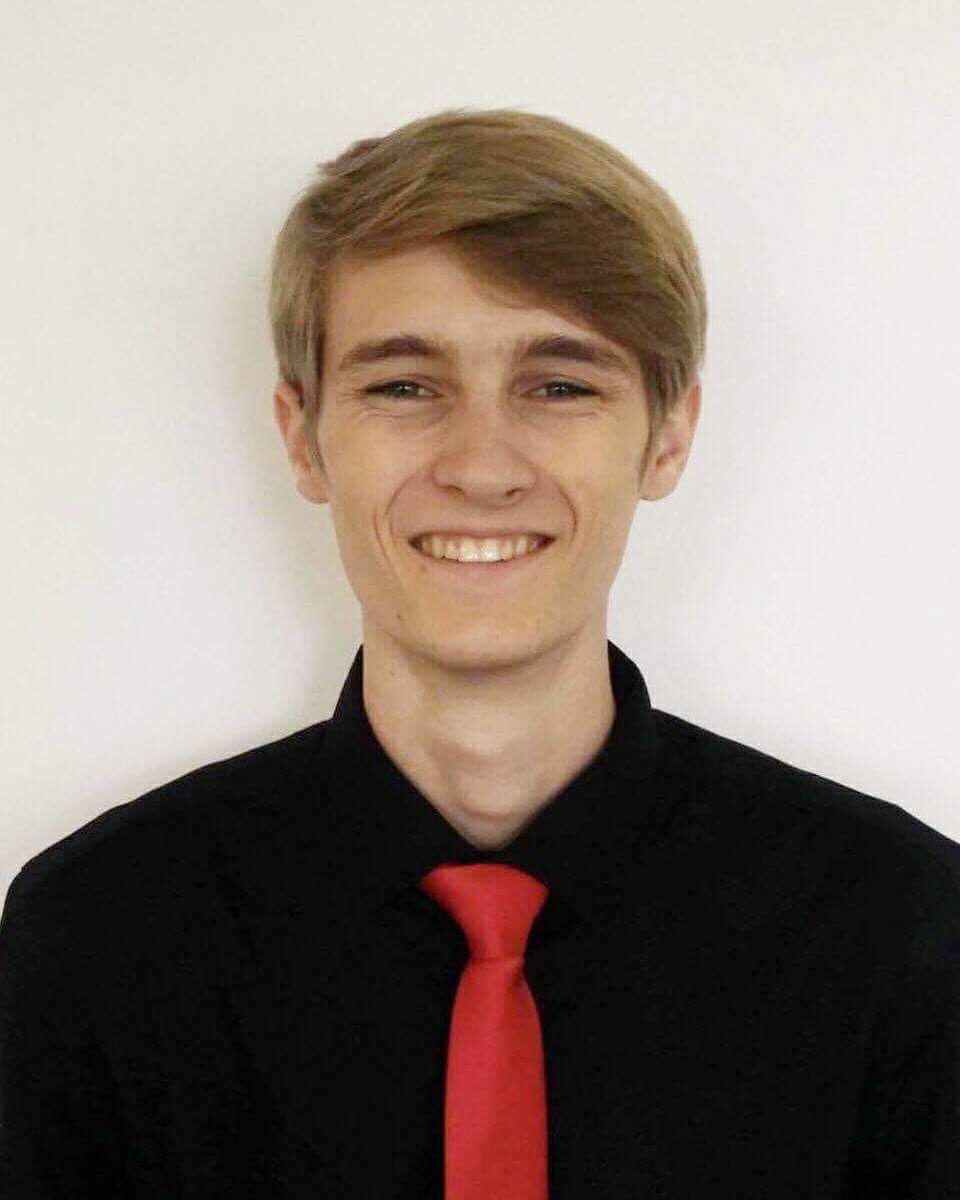
UCLA undergraduate student River Robles was selected to receive a scholarship to attend our summer 2019 session from RadiaSoft LLC. RadiaSoft scientists simulate vacuum chambers, particle accelerators, radiation shielding, X-ray beamlines, thermionic converters, electron beam welding and other systems for industry, universities and national labs. They deliver software solutions via Sirepo, their open source framework for cloud computing, https://github.com/radiasoft/sirepo, which is used to develop intuitive browser-based GUIs for a wide range of high-performance codes. Sirepo.com is their free Science Gateway for particle accelerator and X-ray beamline design. Sirepo/Elegant and Sirepo/Synergia have been used to teach accelerator physics at USPAS and in South Korea. Sirepo/SRW is used for classroom education at La Trobe University in Australia. Congratulations, River!
2019 – USPAS class is her "a-ha!" moment
In an interview by the Adler Planetarium's "Chicago's Black Women in STEAM" series, Jessica Esquivel talks about what sparked her interest in physics, how to make STEAM more accessible to minorities and how the USPAS 'Storage Rings for Precision Physics Applications -- Muon g-2' class was an "a-ha" moment in her career.
Read the full interview here...
2019 – A few minutes with Sam Posen
USPAS alumnus Sam Posen is interviewed by Fermi Today.
2019 – New Scholarships from the APS DPB
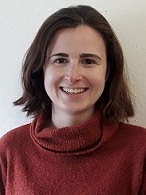
Congratulations to Elisabeth Renner, TU Vienna (left) and Michelle Miller, Indiana University (right) for being selected by the APS DPB to receive a scholarship to attend our June session in Albuquerque. The American Physical Society (APS) Division of Physics of Beams (DPB) is the world’s largest and oldest (est. 1985) professional association of accelerator physics and engineers. The DPB is dedicated to the advancement and diffusion of knowledge regarding the nature and behavior of beams and the instruments for their production. The DPB promotes education in beam science and technology, and provides targeted support and networking opportunities for junior members. For membership opportunities please visit https://www.aps.org/membership/.
Announcements about future DPB scholarships will be made via our website.
2019 – A few minutes with Todd Satogata
Alumnus and instructor Todd Satogata who is "Committed to the Future of Scientists and Science" is interviewed by Jefferson Lab.
Read more here...
2019 – Radiation Physics textbook written by USPAS faculty members
J. Donald Cossairt and Matthew Quinn of Fermilab have written a textbook based on their USPAS course: “Accelerator Radiation Physics for Personnel and Environmental Protection”. This text is a comprehensive reference for accelerator designers, operators, managers, health and safety staff, and governmental regulators. Up-to-date with the latest developments in the field, it allows readers to effectively work together to ensure radiation safety for workers, to protect the environment, and adhere to all applicable standards and regulations.
Read more here...
2018 – Sergey Antipov Receives Outstanding Doctoral Thesis Research in Beam Physics Award
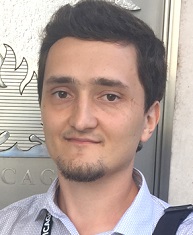
USPAS alumnus Sergey Antipov of CERN received the 2018 Outstanding Doctoral Thesis Research in Beam Physics Award from the Division of Physics of Beams of the American Physical Society "for experimental studies and analysis of the electron cloud build-up and corresponding instability in accelerators with combined function magnets and for the development of an effective mitigation technique applied in the Fermilab's Recycler ring" This award is given annually and recognizes doctoral thesis research of outstanding quality and achievement in beam physics and engineering. Siqi will receive the award and present a talk at a meeting of the APS Division of Physics of Beams. The award was established in 1990 by the Division of Physics of Beams and is supported by Brookhaven Science Associates, Fermi Research Associates, and Southeastern Universities Research Association/Jefferson Lab.
Read more here...
2018 – “Beams and Accelerators with MATLAB” textbook written by USPAS faculty member
Dan Green of Fermilab has written a textbook inspired by his USPAS class “MATLAB for Physics”. The book "Beams and Accelerators with MATLAB" (World Scientific Publishers) explores a first introduction to particle beams and accelerators. It uses the suite of tools made available in the MATLAB package. Since many colleges have a site wide license, these tools are often freely available to students. The text is compact and focuses on graphical data display and dynamical "movies" as an aid to understanding specific systems. Hands on dialogue using command line inputs, "apps", and "live" tools are stressed. The extensive algebraic steps are subsumed into the associated scripts, where the symbolic math utilities spare the reader from the math manipulations. Both beams and periodic structures are covered. Dispersion, insertions, acceleration and light sources are discussed.
Read more here...
2018 – CM&EM textbook written by USPAS faculty members
Gennady Stupakov and Gregory Penn of SLAC have written a textbook based on their USPAS course: “Classical Mechanics and Electromagnetism in Accelerator Physics” . This text is intended for graduate students who are beginning to explore the field of accelerator physics, but is also recommended for those who are familiar with particle accelerators but wish to delve further into the theory underlying some of the more pressing concerns in their design and operation. It includes exercises and discusses a broad range of selected topics from classical mechanics and electromagnetic theory that inform key issues related to modern accelerators.
Read more here...
2018 – Natalie Mujica-Schwahn receives RadiaBeam scholarship
University of Colorado, Boulder graduate student Natalie Mujica-Schwahn was selected to receive a special scholarship to attend our winter 2019 session from RadiaBeam Technologies, LLC a high-tech company specializing in accelerator technology, instrumentation, and applications. The company was founded in 2004 as a spin-off of the UCLA Department of Physics and Astronomy with the mission of bringing high impact, innovative accelerator science concepts from lab to market. Today, RadiaBeam is an internationally-recognized supplier of high-quality accelerator systems and components, with a diverse product line that includes RF structures, magnets, diagnostics, complete accelerator beamlines, complete linac systems, OEM linac structures and betatrons. RadiaBeam also has an active research program focused on novel beam instrumentation, advanced accelerators and light sources, new commercial accelerator systems, homeland security applications, and novel manufacturing techniques. Congratulations, Natalie!
2018 – Jonathan Ang Sixian receives RadiaSoft scholarship
Columbia University graduate student Jonathan Ang Sixian was selected to receive a special scholarship to attend our winter 2019 session from RadiaSoft LLC. RadiaSoft scientists simulate vacuum chambers, particle accelerators, radiation shielding, X-ray beamlines, thermionic converters, electron beam welding and other systems for industry, universities and national labs. They deliver software solutions via Sirepo, their open source framework for cloud computing, https://github.com/radiasoft/sirepo, which is used to develop intuitive browser-based GUIs for a wide range of high-performance codes. Sirepo.com is their free Science Gateway for particle accelerator and X-ray beamline design. Sirepo/Elegant and Sirepo/Synergia have been used to teach accelerator physics at USPAS and in South Korea. Sirepo/SRW is used for classroom education at La Trobe University in Australia. Congratulations, Jonathan!
2018 – Daniel Bowring receives DOE Early Career Research Award
USPAS alumnus Daniel Bowring was one of three Fermilab scientists to receive the 2018 DOE Early Career Research Award, a prestigious award designed to bolster the nation’s scientific workforce by providing support to exceptional researchers during the crucial early years, when many scientists do their most formative work.
Read more here...2017 – Accelerator Dynamics textbook written by USPAS faculty members
Stephen Peggs of Brookhaven National Lab and Todd Satogata of Jefferson Lab have written a textbook titled “Introduction to Accelerator Dynamics”. This introductory text presents a detailed account of the field of accelerator physics, including particle acceleration, collision and beam dynamics, and the important engineering considerations inherent in the effective construction and operation of particle accelerators. It is appropriate for advanced undergraduate and graduate students, accelerator scientists, and engineers.
Read more here...
2017 – Students write Elegant Tutorial
Katherine Woodruff and Sebastian Szustkowski wrote the tutorial "Stern-Gerlach Elegant Simulation" as their final report for Richard Talman and Charles Thangaraj's recent Electrostatic Storage Rings course.
Read their tutorial here...
"Electrostatic Storage Rings” class photo, January 2017
2017 – Free-Electron Laser textbook written by USPAS faculty members
Kwang-Je Kim and Ryan Lindberg from Argonne National Lab and Zhirong Huang from SLAC National Accelerator Lab have written a new textbook titled “Synchrotron Radiation and Free-Electron Lasers: Principles of Coherent X-Ray Generation”, based on course materials they developed for their wildly popular USPAS class “Synchrotron Radiation and Free Electron Lasers for Bright X-Rays”.
Read more here...
"Synchrotron Radiation and Free Electron Lasers for Bright X-Rays” class photo, June 2016
2017 - Arden Warner receives Barbados Golden Jubilee Award
USPAS instructor and alumnus Arden Warner was awarded the "Barbados Golden Jubilee Award for Innovation and Technology" from Barbados Governor General Elliott Belgrave. The award was given in recognition of Warner's contributions to innovative energy research in solar and wind energy, in addition to his contributions to oil spill remediation technology.
Read full article...
Photo Credit: Fermilab
2017 – Carlsten, Nguyen and Sheffield receive Free-Electron Laser Prize
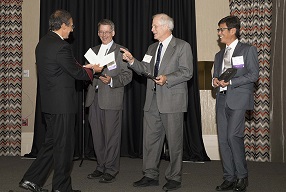
Faculty members Bruce Carlsten and Dinh Nguyen and former USPAS Board of Governors member Rich Sheffield were awarded the 2017 Free-Electron Laser Prize.
"The honor is an international recognition of key technologies that originally developed at Los Alamos in the 1980s and 1990s, such as the radio frequency photo-injector and high-brightness electron beams. These significant innovations also have enabled the x-ray free-electron laser (XFEL) facilities currently in use worldwide."
2017 – Stuart Henderson named Director of Jefferson Lab
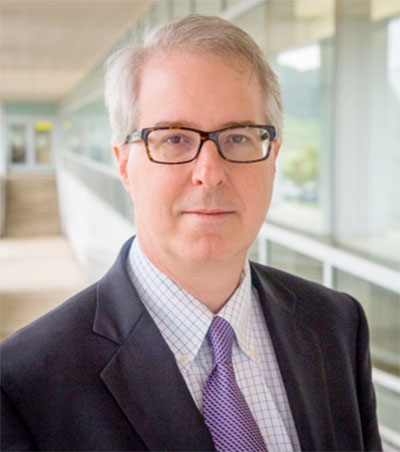
USPAS alumni and instructor, Stuart Henderson, will become the new Director of the U.S. Department of Energy’s Thomas Jefferson National Accelerator Facility in Newport News, Virginia.
Read more here...
2017 - MSU’s Steven Lund selected as fifth USPAS Director
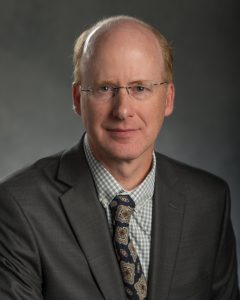
Instructor, alumni, Advisory Council member and Curriculum Committee member Steve Lund has been named the new director of the US Particle Accelerator School. Lund said "I am delighted about this appointment and eager to continue the outstanding work of the USPAS in educating current and future accelerator scientists and engineers," Lund said. "It is a great honor to be selected, and I look forward to guiding the school to continued success."
Read more here...
2016 - USPAS class writes paper and gives an oral presentation at NAPAC 2016
At our summer 2016 session, Prof. Andrei Seryi again taught the course "Unifying Physics of Accelerators, Lasers and Plasma – Synergy and Bridges." As a class project, Prof. Seryi’s students designed a novel light source based on a laser-plasma accelerator. They then wrote a paper detailing their idea for submission to the 2016 North American Particle Accelerator Conference. The paper was selected for an oral presentation and the talk was given by Marlene Turner, a PhD candidate from CERN.
Congratulations to Andrei and to his entire class for their work. This is a first for a USPAS course.
You can download their paper here....
Pictured from left to right are some of the students from Prof. Seryi's class: James Gerity, Marlene Turner, (Prof. Seryi), Auralee Edelen, and Chun Yan "Jonathan" Wong.
Photo Credit: Linda DeVito. Class photo is available here.
2016 - Washington Post article features the magnetic Tim Koeth
The Washington Post wrote a terrific article about how USPAS faculty member and alumnus Tim Koeth is attracting students by sharing his love of Cyclotrons. He'll be bringing his yellow extension cord to Rohnert Park, California in January when he teaches "Cyclotrons and Their Design" for our winter session which is sponsored by UC Davis. Read the full story here....
Photo Credit: Andre Chung/For The Washington Post
2016 - USPAS alumni Daniel Bowring and Charles Thangaraj are the first team from Fermilab funded for Lab-Corps program
With eleven USPAS courses between them, Daniel Bowring and Charles Thangaraj already know about "rigorous and demanding" programs. But they learned even more while taking part in Lab-Corps. Lab-Corps (funded by the DOE Office of Energy Efficiency and Renewable Energy) is a "DOE training program that enables scientists at national labs to spot technologies that have potential for commercialization."
Read full article...
Left to right are Daniel Bowring and Jayakar "Charles" Thangaraj
2016 - Derek Lowenstein receives the Xie Jialin Prize for Outstanding Work in the Accelerator Field
Derek Lowenstein (Former Chair of the USPAS Board of Governors and long-time Board member) is being honored by ACFA for “For his many years of leadership in the accelerator field especially that in the AGS Booster and BNL Relativistic Heavy Ion Collider (RHIC). He led the construction of the AGS Booster, which culminated in the world-record proton intensity in the AGS. This work also formed the basis for the establishment of the NASA Space Radiation Laboratory. He was instrumental in realizing this dedicated facility to study radiobiological effects important to human spaceflight to Mars or other planetary missions. He continued his leadership in overseeing the commissioning, operation and upgrades of RHIC, the world’s first heavy ion and polarized proton particle collider. RHIC is a highly successful accelerator facility with its unprecedented flexibility and outstanding luminosity performance.”
2015 - 25th Anniversary of the Division of Physics of Beams of the APS
Upon the 25th anniversary of the Division of Physics of Beams, Stan Schriber writes about USPAS Director Emeritus Mel Month and the birth of the DPB in their 2015 Newsletter. Read full article...
Mel Month "retired" from the Division of Physics of Beams in 1999.
2015 - Chris Tennant published in Popular Photography
USPAS instructor and alumnus Chris Tennant has two articles published in Popular Photography.
"New York, Forever Wild" and
"Tips from a Pro: Create Inspired Nature Photography".
Photo Credit: Chris Tennant
2015 - DOE Lifetime Achievement award presented to Don Cossairt
USPAS instructor Don Cossairt (far right) was presented with a Lifetime Achievement
Award for Accelerator Safety by the Department of Energy's Office of Science.
Read full article...
Photo Credit: Reidar Hahn, Fermilab
2015 - USPAS wins strong endorsement of the High Energy Physics Advisory Panel
Noting that the United States Particle Accelerator School "plays a key role in training the next generation
of researchers and practitioners who are skilled in harnessing the research potential of particle accelerator
technology to advance science and engineering across a broad spectrum of disciplines and applications," the
Department of Energy's Office of Science charged the High Energy Physics Advisory Panel to perform a
retrospective review to evaluate the effectiveness and cumulative impact of USPAS as well as to assess the
overall quality and breadth of the USPAS program.
"USPAS very effectively delivers both training and workforce development. USPAS's effectiveness derives
from an organizational model responsive to the workforce development and training needs of the DOE laboratories
that simultaneously addresses key needs for workforce development and training."
Read entire report...
2015 – Sergey Belomestnykh Receives Particle Accelerator Science & Technology Award
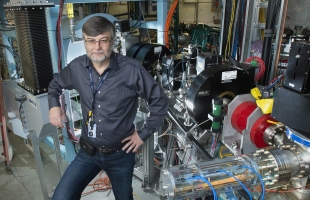
USPAS instructor, Sergey Belomestnykh, is being recognized by the Institute of Electrical and Electronics Engineers Nuclear Plasma Sciences Society (IEEE NPSS) for his outstanding contributions to the development of particle accelerator science and technology.
Read more here...
2015 - Arden Warner patents new technology to clean oil spills
USPAS instructor and alumnus Arden Warner patents new technology to clean oil spills. See more info at EMOP.fnal.gov
2014 - Zhirong Huang's road to success at SLAC
From SLAC National Accelerator Laboratory....A featured article about USPAS faculty member, 2011 Achievement Prize recipient and alumnus Zhirong Huang of SLAC and Stanford University. Read full article...
Photo Credit: William Barletta
2014 - Oak Ridge National Lab gives back to USPAS
As reported by Oak Ridge National Lab's "Highlights", when the University of Tennessee Knoxville sponsored the winter 2014 USPAS session, several ORNL staff members took advantage of the opportunity to give back to the USPAS by teaching courses. Oak Ridge also generously arranged a tour of their facilities. Read full article...
2013 - USPAS Lifetime Achievement Award presented to SY Lee
From the Indiana University "Newsroom".....SY Lee, Professor of Physics at Indiana University and former USPAS Director was awarded the USPAS Lifetime Achievement Award in Accelerator Physics and Technology in 2013. Read full article...
2012 - Rod Gerig voted Chair of the USPAS Board of Governors
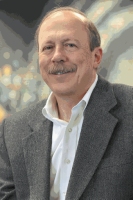
Deputy Associate Lab Director for Photon Science at Argonne National Lab, Rod Gerig was selected Chair of the USPAS Board of Governors.
Read more here...
2011 - Educating and Training Accelerator Scientists and Technologists for Tomorrow
Read the paper published by William Barletta, Swapan Chattopadhyay and Andrei Seryi published in the
Reviews of Accelerator Science and Technology.
"Accelerator science and technology is inherently an integrative discipline that combines aspects of
physics, computational science, electrical and mechanical engineering. As few universities offer full
academic programs, the education of accelerator physicists and engineers for the future has primarily
relied on a combination of on-the-job training supplemented with intense courses at regional accelerator
schools. This paper describes the approaches being used to satisfy the educational interests of a growing
number of interested physicists and engineers."
Read full paper...
2010 - Accelerator school travels university circuit
In 2010, Physics Today ran the story "Accelerator School Travels University Circuit". The article talks about the impact the USPAS has in the area of accelerator education. Read full article...
2008 - A Fearlessly Creative Workforce
Symmetry Magazine explains how the USPAS allows accelerator physicists a
chance to share their knowledge with the next generation of scientists and engineers.
Read full article...
"Mike Syphers teaches accelerator science not only to physicists, but also to people working
in medical, military, and manufacturing fields."
Photo Credit: Reidar Hahn, Fermilab
